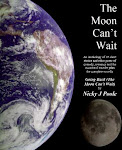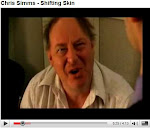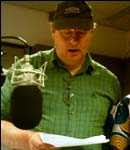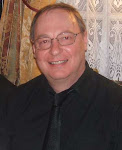Short story of a young man brought up in a repressive household, by straight-laced father with a sinister, obsessive secret after meeting a curious visitor.
I’ll never forget the time I first saw him. It was a fine summer day in early May and Father was almost finished getting dressed for church, when there came a knock at the front door.
"Who on Earth can that be calling on a Sunday?" said Mother. Father glowered but didn’t speak, as he was still struggling to fasten his tie over his stiff collar. "Should I answer it?" said Mother, reading something in Father’s silence.
"Whoever it is, send him packing. It’s not Christian to call unplanned on a Sunday."
My Mother went down the dark hallway to the door and opened it, letting a torrent of sunlight in from the chasm of the terraced Aigburth street. For the moment I was blinded, nor could I hear the muted conversation from the door. The uninvited stranger was not in retreat, it seemed. Father, having mastered the knot in his tie, strode up the hallway, shouldering my mother aside. Perhaps I followed a step or two in his wake. There I could see a man, dapper, in his late fifties, grey hair at the temples. On seeing my father he raised his trilby hat.
"Er-oh, hello," he said politely, in a gentile, public-school accent. "My name is Tibbets. Have I the pleasure of addressing the man of the household?"
"And what might your business be?" said Father, his tone none too friendly.
"Business, ah, business. Yes, it is a business. But not in the conventional sense. Not an enterprise, not that kind of business at all, my dear fellow."
I could see Father stiffen at this trite pleasantry. "Tell me what you want and be quick about it, so the sooner you can be on your way."
"Yes, of course, of course. But perhaps not here on the doorstep. It is a matter of some discretion."
"It’ll be on the doorstep or nowhere at all."
The stranger, replacing his hat, gave the merest flicker of a glance in my Mother’s direction. "Very well," he said, a faint hint of regret in his voice, "but it is something only you and I should discuss. A lady," he flashed the briefest of smiles at my Mother, "might be, how shall I say? – disquieted."
Father bristled, caught in indecision. Mother intervened. "I’ve the Sunday tea to be getting on with," she said, diplomatically. "Excuse me." With that, she retreated down the hallway to the kitchen that lay at the back of the house. I, still in the doorway of the front parlour, continued to listen astutely.
"What is it then?" Father demanded.
"Sir," said the stranger, in his cultured, well-educated voice, "I have a certain – adeptness – a skill, if you will, granted me by a Higher Power. Or at least, I assume it is from a Higher Power, for I have certainly made no effort to cultivate it myself. This – adeptness – gives me a sensitivity to things."
I was wondering how much of this circumlocution my Father would tolerate before he slammed the door in the stranger’s face so that he could return to his Sunday habits. But the slam I anticipated did not come. The stranger appeared to have captivated my Father’s normally impatient attention.
"Things?"
"Things," continued the stranger. "Things that are not of this corporeal world."
Whatever I had expected my Father to say, what he did say surprised me.
"What’s that got to do with this household?"
"As I say, I have a sensitivity. I happened to be walking past your home on this glorious afternoon," – he paused to indicate the sunlight hammering off the brickwork of the terraced houses – why anyone should just happen to wander down our street, or any of the dozens like it in this part of Liverpool, was itself a mystery – "when I sensed that all was not well with this house." Suddenly, the polite flippancy of his earlier speech was gone. His tone became grave. "Not well at all."
I was certain my Father would have no more of this conversation. But I was mistaken. Still he held open the door to the stranger.
"What’s wrong with it?" he said.
The stranger looked almost uncomfortable. He lowered his voice a note and I had to strain to hear. "Sir, I must speak plainly. Your house is in habited with spirits. Many spirits. And these spirits are in torment."
I saw my Father's shoulders raise – surely now the door-slam would come. But then they sagged, as if he had been caught out with some accusation he could not deny.
"What is that to you?" he said, lamely.
"I have come to take these spirits away, and let them move on to a happier place."
"An exorcist?" I could not tell whether my Father spoke in surprise, derision, or merely resignation. Or possibly even fear. His tone was so ambivalent, so unlike him. His usual religious leanings were strictly conventional, the Bible, fire and brimstone, and that was about it. It was almost as if he had become a stranger to me. As strange as the caller standing in our doorway.
"A guide," corrected the stranger. "A messenger, a healer, no more." His voice recovered some of its earlier levity.
"And what’s your fee?" my Father demanded, more like his brusque, usual self.
"My dear fellow, there is no fee. It is a service, the use of a talent that I never aspired to. Regard it as a hobby, if you wish. What I can promise you is that you will not be sorry by the time I am finished."
To my astonishment, my Father said, "You’d better come in." I nipped out of the parlour doorway sharply and pretended to be busying myself before the mirror. My Father ignored me as if I were not even there and guided the stranger into the parlour, closing the door firmly behind him. It was more than I dare risk to listen at the door, so I have no idea of the conversation between the two men, but it was more than an hour later before the stranger and Father reappeared. The stranger seemed to be in the same, chipper mood with which he had arrived, though my Father was quiet, ashen in appearance.
"Good day to you, sir," said the stranger, tipping his hat once more. "I shall see you again within the week." With that, he was gone. My Father, without speaking, retreated to the bedroom. I did not see him again that day, and he did not attend church, as was his custom.
True to his word, Mr Tibbets returned one evening later in the week. This was to be the first of many such visits. My Mother, myself and my Mother’s sister, Minnie, who lived with us, were all banished from the front parlour during his visits, which we had to sit out in the breakfast room with no consoling explanation until Mr Tibbets left. We could hear the faint murmur of conversation between the two men, but of what they spoke we had no clue. On the third or maybe fourth visit, I heard my father come out of the parlour and climb the stairs to the bedroom then descend. Evidently, he had returned with the key to the cellar, the access to which was by a door below the stairs that was always kept locked. From time to time in the past, my father would disappear down there, in the darkness, maybe for an evening, or early in the morning before the rest of the household rose, but would never give any explanation of his actions. Indeed, even to ask of one was to invite at best a brusque and at worst a harsh rebuttal from my father. On more than one occasion – not a frequent event but one that would come around from time to time, I had found myself alone in the house – my mother, father and aunt would all be occupied elsewhere – and I had searched my father’s room for the key to the cellar, without success. I had absolutely no idea in what activities he was engaged whilst down there. Evidently, however, he had no reservation in letting Mr Tibbets enter this private domain.
After this first time, my Father took Mr Tibbets down to the cellar on a number of occasions. Always, after they had entered, I would hear the key turned in the lock from the inside and some time would pass before its sound was to be heard again. No-one ever asked my Father why he and Mr Tibbets descended to the cellar as there would have been no point – he never would have answered.
It was hard to gauge my father’s mood before and after Mr Tibbets’ visits. Subdued, mollified would be about it, and a contrast to Mr Tibbets’ own, which was on a borderline between conviviality and deference. Polite, cheerful but earnest, as if he were about some purpose of servitude. But what this purpose might be, my father never explained. And when he had nothing to say on one matter, he was wont not to speak at all.
This changed in an unexpected manner. On one of his visits, for some reason – maybe he was early – the door was opened to him by my Aunt Minnie. Minnie was, I realise now, looking back, a bit of a dotty creature who had never married nor worked. Aside from seeming a little simple, she was pleasant enough, sharing my mother’s good looks with an added note of facile charm, a kind of innocence. On seeing her, as I observed slyly from the entrance to the breakfast room, he seemed delighted. A smile of genuine pleasure, rather than the polite demeanour he normally adopted, lit up his countenance. My father, hearing Mr Tibbets’ arrival, virtually bundled him away from Minnie and into the parlour, where the door was closed with a bang.
After that, Mr Tibbets’ calls became more frequent, and he would consistently appear to arrive ahead of expectation. If ever Aunt Minnie opened the door to him, he always beamed with delight, exchanging pleasantries or something more – I wasn’t on every occasion able to hear. That this was not to my father’s approval was easy enough to infer, but was confirmed beyond all doubt, when, on one evening, conversation from the front parlour increased in volume and became more heated, climaxing with my father clearly exclaiming, "You are in my house to do your business, Tibbets, but on no account are you to have dealings with my family, especially my sister-in-law!"
Tibbets could be heard protesting his case, but to no avail, it seemed. Father effectively threw Mr Tibbets out, their business, whatever it had been, concluded. Mr Tibbets barely had chance to retrieve his trilby from the coat-rack. I never saw him again.
I never saw my Aunt Minnie again either. She simply did not return to the house next day, having apparently gone on some errand or other. The police were eventually informed, but no trace of her was ever found. There was nothing of hers missing from the house. But after a period of searching, the police merely concluded that people went missing all the time and there was nothing further of any practical value they could do. There was simply no reason to suspect foul play and that was that.
Time passed, and nothing was heard of Mr Tibbets, nor my Aunt Minnie again. It seemed indelicate even to discuss the matter, let alone suggest the two disappearances might have been connected. When my school exams came up and I got good grades that enabled me to read English literature at university in London, it was, I later realised, with some relief that I was able to leave that claustrophobic household. My only regret, which I realised too late, was that I had turned my back on my Mother, and her death from a sudden stroke, while I was still away, hurt me grievously. I should have kept in touch and I felt guilty. I had no such inclinations towards my Father. At her funeral, all he said was, "Brutal, but mercifully quick." There was some speculation that Aunt Minnie would suddenly appear at the burial of her sister but to no avail. I went back to London, without concern for my Father now living alone in the empty, draughty household and I did not make any attempt to keep in touch with him.
I lacked any idea of a career. I started writing little pieces and submitting them to the quality newspapers and certain magazines and, to my mild surprise, they were accepted and I received payment. After graduating, it was an easy way of making money. It’s funny how you can do something once, then repeat it until it becomes a habit and before long it is taking up all of your free time. Without any formulated plan I realised that become a freelance journalist. Yet it didn’t feel like an occupation and the money, though adequate and pleasant, was almost irrelevant. It was more like a pastime. I had settled into my new life comfortably, when, one day in early summer, I received a phone call out of the blue.
It was the police. My father, with whom I had had no contact since my mother’s funeral, had died suddenly, a fact that had been detected by the milkman who noticed that his deliveries were not being collected off the doorstep. The police explained that the coroner’s office had been notified, which was standard procedure in the case of a sudden death, but would I travel back home as soon as possible? They needed somebody to identify the body.
When I got off the train at Lime Street I was met by two CID officers who said they had some questions. I tried to determine whether I was under arrest for something. They remained vague on the point, saying that I would merely be helping with enquiries, but the supposition was that, had I refused, they would indeed have arrested me.
"Enquiries into what?" I asked, and repeated the question when we reached the police station.
"Enquiries into how fourteen bodies come to be buried in the cellar of you family home."
Shock is such a short word for the conflicting tumult of emotions that struck me now. A whole series of questions sprang to mind at once with the effective result that I was unable to speak at all for several seconds. When I did, it was to ask what, in retrospect, may have seemed an odd question: "How long of they been there?"
"None of them is recent," said a quietly spoken senior officer whom I suspected of being rather sharper than he looked. "In fact, some form of embalming or preservative process seems to have been carried out on them."
Then he added, in a tone I did not like at all, "You were probably still a child when the last of them was, what shall we say? – laid to rest."
"Who are they?"
"We were hoping that you might be able to shed some light on that matter."
This detective took some considerable convincing that I could not, that I did not know anything at all of their existence and had no idea how they had ended up as they had. But there came a point at which the officer suddenly seemed to become satisfied. "The bodies are all male, men in late middle age."
A thought struck me. "Are you sure none of them is female?"
"A forensic pathologist has been over every corpse. Why, were you expecting someone in particular?"
"Of course not." I don’t think I sounded too convincing, even to me. But the officer continued.
"We were doing only a routine search of the house when we became suspicious. The floor of the cellar was bricked, but it was way too uneven and the bricks came up too easily. Much later on, we were going through your father’s possessions and we came across this." He produced a hard-backed note book, the sort that had that curious cobweb-like pattern in dark blue bands across the cover. Not unlike my old school exercise books.
"What is it?"
"It’s a kind of diary. Meticulously kept. The first entry relates to an incident that occurred while you, your Mother and your Aunt were all out. He stresses this point several times. A gentleman came to the door in some distress, asking your father for help. He was having some kind of attack it seems. Your father went to make him a cup of tea and by the time he returned from the kitchen, the gentleman was deceased. Your father found some medication on him, digitalis – it used to be prescribed for heart conditions. Your father records here," he rested his hand on the page, "that he felt guilty for not having checked with the gentleman first about his health before leaving him on his own.
"He goes on to say – I won’t go into detail – that your father decided to attempt to lay him to rest in your cellar – some kind of act of contrition - he says here – ‘a kindness.’"
"That’s odd," I said, dumbly, "my father wasn’t noted for his kindness."
"That’s the only thing you find odd?" said the detective with a curious stare.
"I mean, I – " I stumbled for words. "No," I managed at last.
"Well, it seems his kindness didn’t end there," the detective sniffed. "After that, your father committed a number of ‘kindnesses’ on various old fellahs that he came across, usually at the church mission. Chaps he identified as lonely old blokes who’d no family, no friends, generally fallen on hard times – and, of course, wouldn’t easily be missed. He used the digitalis on the first few – it’s related to deadly nightshade, of course – and when that ran out he employed other means. Then he wrote it all up in his log book," he raised the note book to my face, "names, dates, any other details…" he closed the book, steepled his big bony hands underneath his chin, "then stuck ‘em in the ground below where you were living." There was that stare again, as if he could see right to the very back of my mind.
"I – honestly – I swear – I knew nothing about this."
The detective leaned towards me conspiratorially. "And I believe you. Your father makes it perfectly clear he kept his private activities to himself. But, of course, I had to check. I think if you’d known anything I’d have got it out of you by now."
I felt as if I ought to thank him; then again, he had suspected me of conspiracy to murder, and, while I thought this over, the moment passed. Then something else occurred to me. "You say all the victims’ names are recorded – written down – in – in that book."
"Yes. Of course, we’re still checking them, but there were various personal effects that you father had also kept and so far they all tally with the bodies."
"There was no mention of a Mr Tibbets in there, by any chance?"
"Who’s Mr Tibbets?"
"He is – was – is – a stranger who came to the house while I was still at school. He and Father seemed to have some kind of business, then my Father had a sort of falling-out with him and threw him out of the house. I never saw him again."
"When was that?"
I gave a date accurate to the best of my recollection.
The detective shook his head. "There’s no Mr Tibbets mentioned in here. And the last body your Father laid to rest was some months earlier."
"There were no more deaths after that?"
"Not according to this, and the pathologist agrees."
When I got back to the house, it was after sunset, but there was still an afterglow out over the Mersey. Under the circumstances, it was rather eerie. Despite my long absence, I still had a key and let myself in to dark, silent house. The interior was, as ever, cool, the heat of the day had never penetrated those sullen bricks. I snapped on a light, a bare bulb, in the front parlour. What should I do now? It was too late to get back to London tonight. It was a grim prospect, the thought of spending the night trying to sleep over a graveyard. Yet I’d done it, apparently, for years.
Suddenly I had an idea. I realised what an astonishing story this was. I could sell it for a big fee, and live high in the hog for months. I found some paper in the old bureau, laid it and my pen on the parlour table, and sat down to write.
It was then that I noticed the trilby hat, hooked over the back of the chair opposite me.
THE END
.jpg)






No comments:
Post a Comment